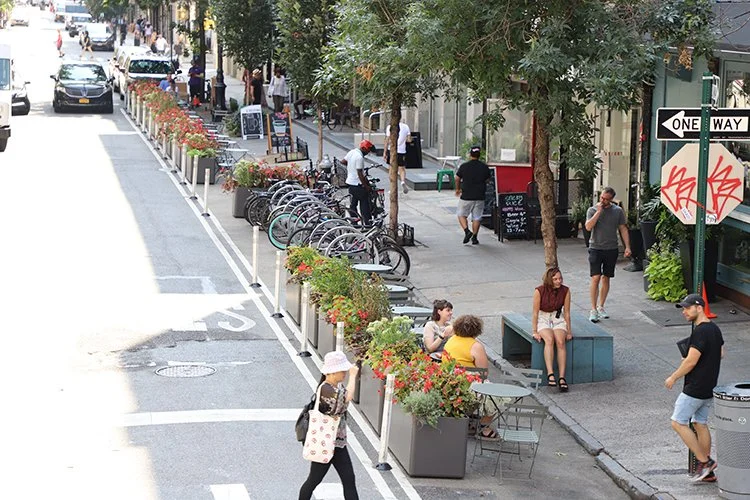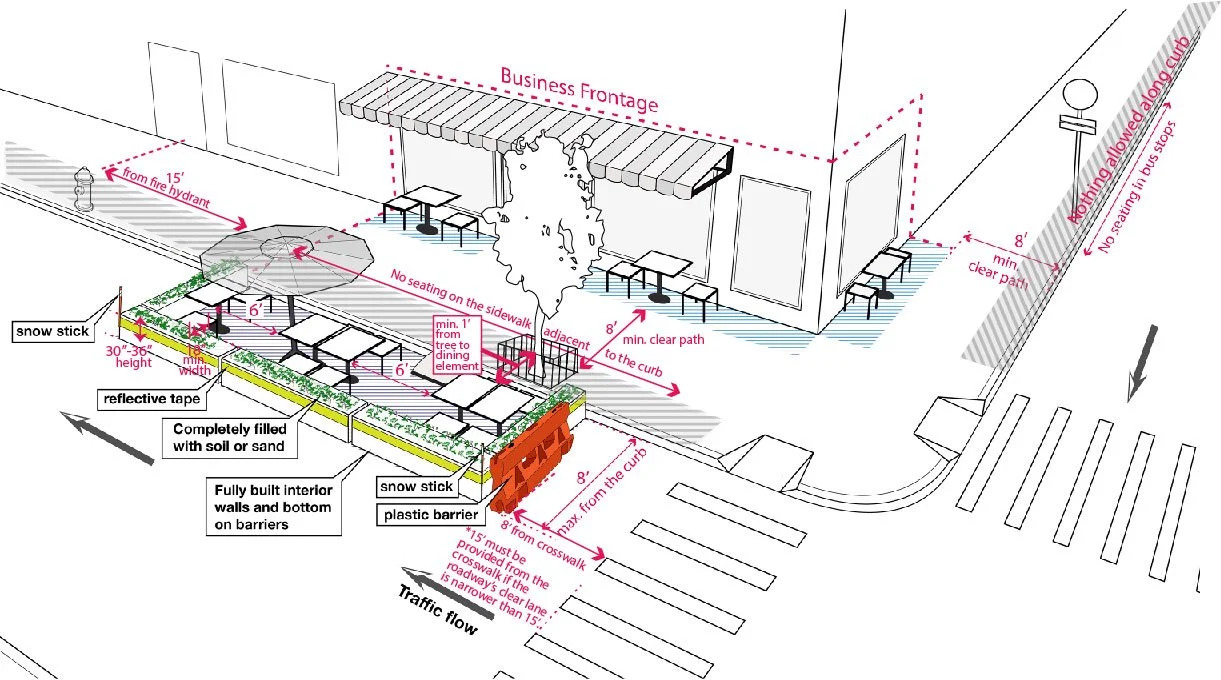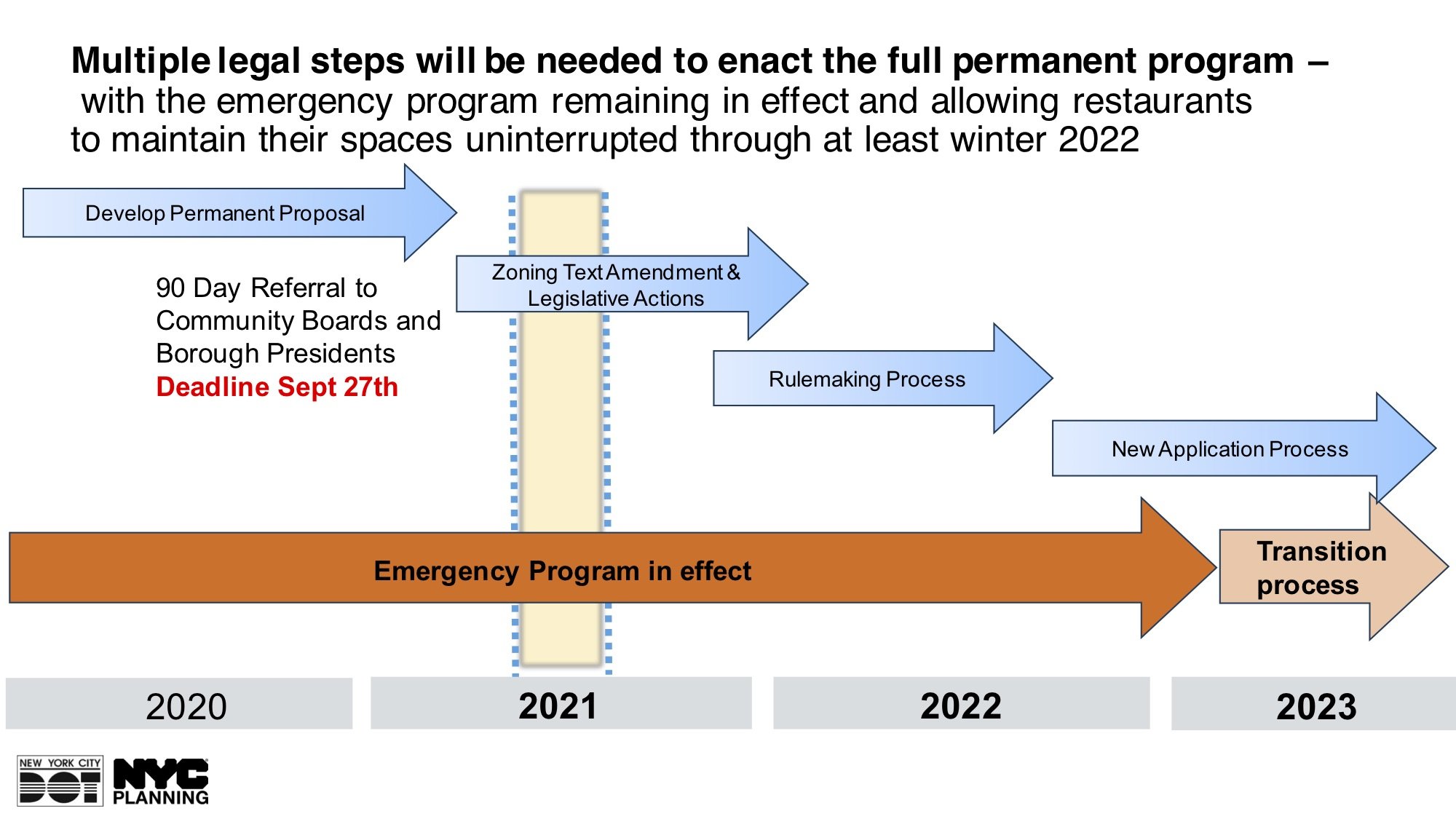Permanent Open Restaurants Program
On the heels of the recent City Planning Commission approval, many may be wondering how the Permanent Open Restaurants Program will reshape our streets, how it will be regulated, and how soon it will go into effect.
On November 15, 2021, the City Planning Commission (CPC) unanimously voted to approve the Open Restaurants Program Text Amendment, which would create a permanent Open Restaurants program managed by the New York City Department of Transportation (DOT). Before the Permanent Program is enacted, it will still need to be approved by the City Council and Mayor, after which DOT will be required to design and develop the Permanent Program and enact agency rules and legislation. But before we get into the details and timeline of the Permanent Program, we should first understand the current outdoor dining rules and regulations.
Current Outdoor Dining Regulations:
Before the COVID-19 Pandemic, outdoor dining was mainly allowed through two programs: (1) the sidewalk café program administered by the Department of Consumer and Worker Protection (DCWP), and (2) Street Seats program administered by DOT. The months before the Pandemic hit New York City, there were 1,224 active permits for sidewalk cafés and 25 active permits for street seats. During the Pandemic, the City suspended the sidewalk café program and enacted the temporary emergency open restaurants program, by which restaurants could self-certify applications for outdoor seating. By March 2021, there were a total of 10,131 self-certified applications.
Sidewalk Café Program. The sidewalk café program, regulated by the Zoning Resolution (Article I, Chapter 4: Sidewalk Regulations), permits only three types of sidewalk cafés: enclosed cafés, unenclosed cafés, and small unenclosed cafés. Unenclosed sidewalk cafés are allowed in commercial, manufacturing, and high density residential districts only (subject to further restrictions in specific districts, streets, and special purpose districts). Enclosed cafés are allowed in most locations, except in certain special districts like Hudson Yards, Lower Manhattan and East Harlem. Small unenclosed cafés are only allowed in some areas of Manhattan. These three café types are all subject to the New York City Administrative Code clear path regulations for pedestrian passage based on location, sidewalk width, and sidewalk obstructions; DCWP regulations governing signs, set-up, table count, railings, fences, planters, valences, canopies, awnings, and heaters; and regulations and approval processes under the jurisdiction of the New York City Department of Buildings (DOB) and the Landmarks Preservation Commission (LPC).
Street Seats Program. The street seats program allows businesses, institutions, Business Improvement Districts (BIDs) and non-profit organizations to apply to DOT for a permit to place seating for outdoor dining or other activities in the roadbed along the curbline. The design requirements imposed by DOT require protections for users of the street seats, and regulate their placement and location to ensure the seats do not obstruct the sidewalk, roadway, infrastructure or amenities. The streets seats program is also subject to operating hour restrictions.
Emergency Open Restaurants Program. The temporary emergency open restaurants program was enacted in response to the COVID-19 Pandemic under Local Law 77 of 2020 and Mayoral Emergency Executive Orders 126 and 128. The sidewalk café program was suspended, and instead, under this emergency citywide program restaurants were able to apply to DOT and self-certify the use of sidewalk and roadways for seating, subject to certain requirements with respect to structures (type, location, height, materiality) heaters, and sound. Specific regulations were also established for sidewalk seating and roadway seating to ensure the safety of pedestrians, diners, restaurant staff, cyclists, and motorists, as well as clear path requirements, hours of operation requirements and the like.
The Proposed Permanent Open Restaurants Program:
Per Local Law 114 of 2020, the Permanent Program is to succeed and replace the temporary emergency open restaurants program, as well as the sidewalk café program. According to the Project Description, the citywide Permanent Program, which will be run by DOT, will do away with “outdated geographic prohibitions on where sidewalk cafes can be located” and further, ”support small businesses and job creation in the restaurant industry, activate our streets, and simplify and streamline our rules for outdoor dining under a single agency.” Moreover, DOT and the Department of City Planning (DCP) have stated that the Permanent Program will “build on the successes and the lessons learned during the emergency Open Restaurants program. The permanent program . . . will balance the needs of everyone using our streets and sidewalks while ensuring they are safe and vibrant.”
The DOT’s Vision for the Permanent Program is as follows:
DOT will administer both the sidewalk and roadway café programs through a streamlined application process.
The Permanent Program will allow for outdoor dining on the sidewalk and in the curbside roadway space.
The Permanent Program will be available citywide.
The Permanent Program will establish detailed, upfront design guidance based on the design guidelines outreach process.
The Permanent Program will require license agreements for both sidewalk and roadway seating.
The Permanent Program will be subject to enforcement from the full DOT enforcement unit to regulate roadway structures, ADA Compliance, clear path, and amplified noise devices.
The Permanent Program will enable DOT to continue to coordinate with other city agencies on enforcement and rules regarding the Permanent Program.
The Key Principals for the Permanent Program are as follows:
Accessibility: It will require setups that are inclusive to all users.
Appearance: It will ensure clean, attractive and well maintained setups that enhance the local community.
Equity: It will ensure that all restaurants and all neighborhoods have an opportunity to participate.
Neighborhood Context: It will ensure setups work well in varying street contexts and neighborhood characteristics.
Safety: It will put safety first, providing access for emergency vehicles and ensuring that setups are safe spaces that protect pedestrians, diners, and drivers.
Although not subject to a full ULURP, from June 2021 through September 2021, the local community boards were given the opportunity to review and vote on the text amendment. On October 6th, 2021, the CPC held a hearing on the text amendment. Throughout this review process, the Permanent Program garnered both support and opposition: some members of the public support the Permanent Program as it saved thousands of jobs and vastly transformed streets into active spaces, while others voiced concerns about quality of life issues such as trash, noise, and the loss of parking spaces. A handful of residents have even sued the City in an attempt to block the Permanent Program.
On November 15, 2021, CPC voted to approve the text amendment; however, in order for the text amendment to be enacted, it will still need to be voted on and approved by the City Council and Mayor. In addition, CPC modified the application in an important way: the text amendment will not actually go into effect until the Permanent Open Restaurants Program details have been ironed out through a public engagement process, and new DOT rules and legislation have been enacted.
Next Steps—Developing the Permanent Program:
As part of developing the Program, over the next several months, DOT and DCP are planning a series of Outreach Meetings across the five boroughs in order to share an overview of the Program’s design guidelines process, goals, and solicit direct feedback from the public. Specifically, DOT is asking: “What are your priorities for the permanent program and what are your ideas for how the program can create dining setups that are safe, accessible, equitable and good neighbors?” Those meetings are scheduled for the following dates:
Queens, Monday, December 6, 2021, 5:30pm
Brooklyn, Tuesday, December 7, 2021, 6:00pm
Bronx, Thursday, December 16, 2021, 10:00am
Manhattan, Friday, December 17, 2021, 9:30am
Staten Island, details to follow
In addition to outreach meetings, DOT and DCP will be hosting Virtual Roundtables open to all New Yorkers to bring together a variety of stakeholders from the hospitality industry, design professions, transit and accessibility advocates, as well as the general public, to discuss and address potential issues of the Program. The first two meetings are scheduled for the following dates:
Tuesday, January 11, 2022, 12:00pm - 1:30pm
Wednesday, January 12, 2022, 6:00pm - 7:30pm
In the meantime, if you have feedback on the Permanent Program, you can submit your comments via this DOT Survey until December 31, 2021!
Sources:
New York City Department of City Planning. Open Restaurants / Sidewalk Cafes, Project ID No. N21043ZRY, Submitted June 18, 2021. NYC Planning - Zoning Application Search. https://zap.planning.nyc.gov/projects/2021Y0291.
Permanent Open Restaurants Text Amendment - DCP. https://www1.nyc.gov/site/planning/plans/open-restaurants/open-restaurants-overview.page.
Open Restaurants. New York Department of Transportation. https://www1.nyc.gov/html/dot/html/pedestrians/openrestaurants.shtml.
Rose, Veronica. (October 10, 2021). Community Boards Share Many Concerns Over Permanent Restaurant Program. CityLand. https://www.citylandnyc.org/community-boards-share-many-concerns-over-permanent-restaurant-program/.
Yakas, Ben. (October 20, 2021). 'The West Village has become lawless': Locals sue to keep open restaurants from becoming permanent. Gothamist. https://gothamist.com/food/open-restaurants-nyc-lawsuit-complaints.
Rose, Veronica. (November 16, 2021). City Planning Commission votes to approve Permanent open restaurants program text amendment. CityLand. https://www.citylandnyc.org/city-planning-commission-votes-to-approve-permanent-open-restaurants-program-text-amendment/.
Yakas, Ben. (November 19, 2021). Here's how you can take part in the future of NYC's Outdoor Dining. Gothamist. https://gothamist.com/food/nyc-outdoor-dining-future.





